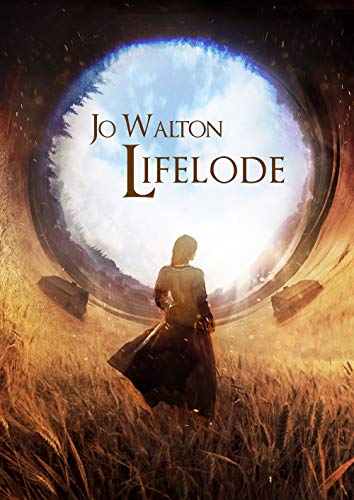Every year from the time she comes from Margam Taveth makes a huge plait which the harvest queen cuts at the festival. This is the last year she makes one, because later they remind her of Jankin and all that has happened. [loc. 1655]
If you travel east from the small village of Applekirk, you will eventually meet gods and lose your sense of self: and should you travel back towards Applekirk, you'll find that time has passed more swiftly there than it has for you. Travelling west brings you to lands without magic ('yeya', or more formally 'the aeaean arts') where the people are little more than automatons.
The scholar Jankin comes east to Applekirk and finds himself drawn to the women of the manor house, Taveth and Chayra. Hanethe, who grew up long ago in the manor house, flees west to Applekirk, pursued by a vengeful deity. Both Jankin and Hanethe bring change: and Taveth, who is at the heart of Lifelode (though by no means the only narrator), reflects on events of the past.
Except that for Taveth, past and present and future all blur together. She sees across time, sees the older and younger selves of those around her, sees everything but can change nothing: and thus 'the order of events is hard to set straight'. Lifelode is present-tense throughout, no matter who's narrating or whether the events are in 'the past' (the time before Jankin and Hanethe come to Applekirk) or not. This creates a sense of simultaneity: everything happens at once, everything is immediate. "She'll never get over it," says one character of Taveth's reaction to a tragedy: 'truthfully, for she never does'.
The underlying plot is simple, almost mythic: the vengeance of a goddess of marriage against someone who has offended her. (The offence is an interesting one, and the manner in which it's committed unique to this setting.) The goddess's vengeance is wreaked against those who shelter the guilty party: against Ferrand, the lord of Applekirk, and his wife Chayra, and his 'sweetmate' Taveth, and her husband Ranal. Jankin, entering stage left (or west), throws the family's interpersonal relationships into disarray: Hanethe, entering stage right (or east), brings social complications.
The world-building is fascinating: this is a world without notable gender roles (women, as well as men, are soldiers), a world where all kinds of sexuality (and none) are accepted and unremarkable, a world that may be flat, a world where gods and magic exist according to longitude. The focus of Lifelode, though, is on the family who hold the manor at Applekirk -- especially the women, and their relationships: with their children, with the villagers, with their lovers, who may be the people they fall in love with or simply the people they love. (I don't think there are any explicit M/M relationships here, though there's at least one F/F ...) It's a beautifully-crafted novel, with a vaguely medieval feel and a focus on the ways that people communicate (and don't communicate) with one another.
Lifelode -- the word refers to one's purpose, one's vocation and how one puts food on the table -- feels like a very summery novel. For all the magic and the grand themes, it's comfortable and comforting: exactly what I needed. Finally available in affordable ebook format, hurrah!

No comments:
Post a Comment